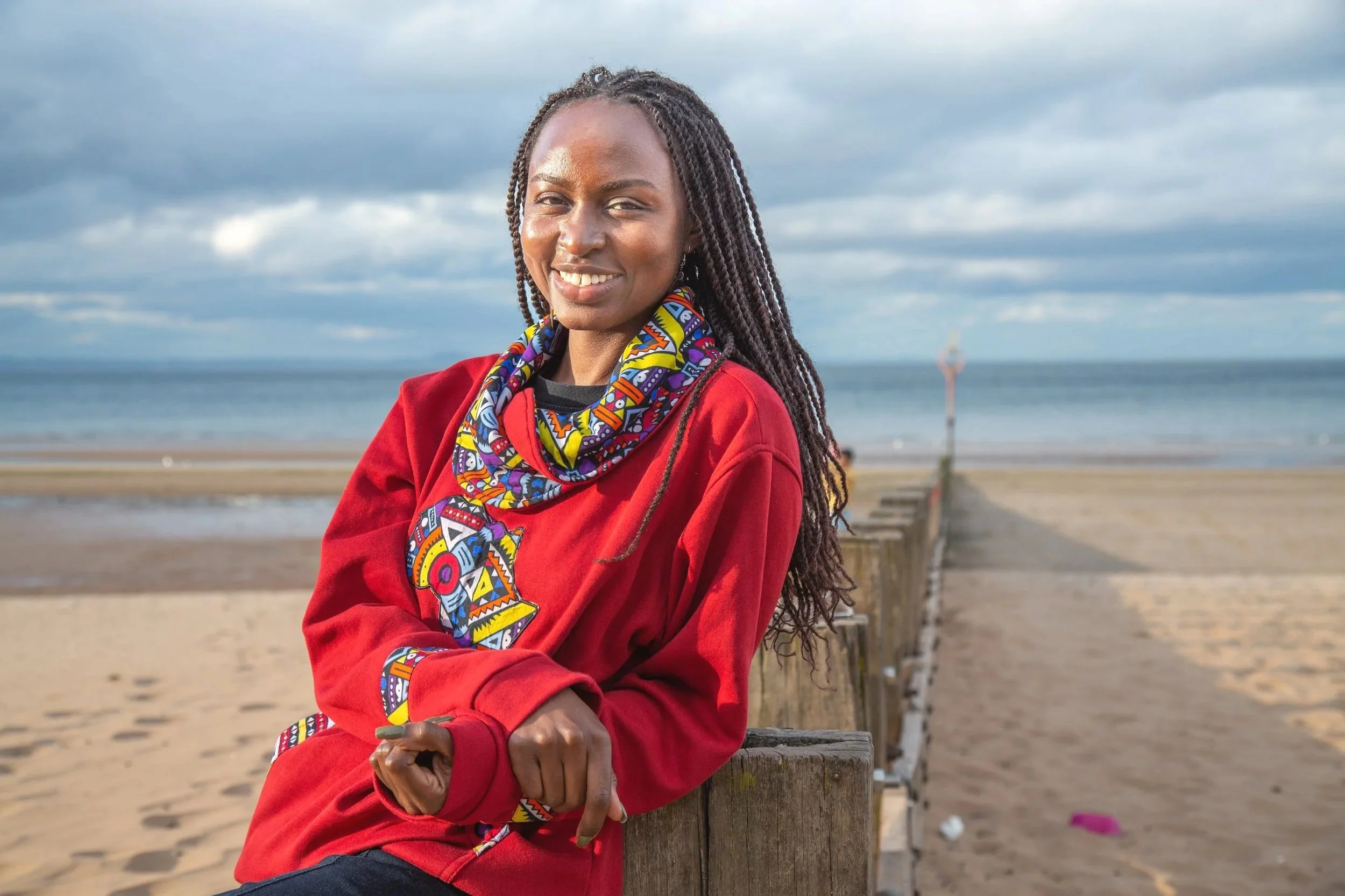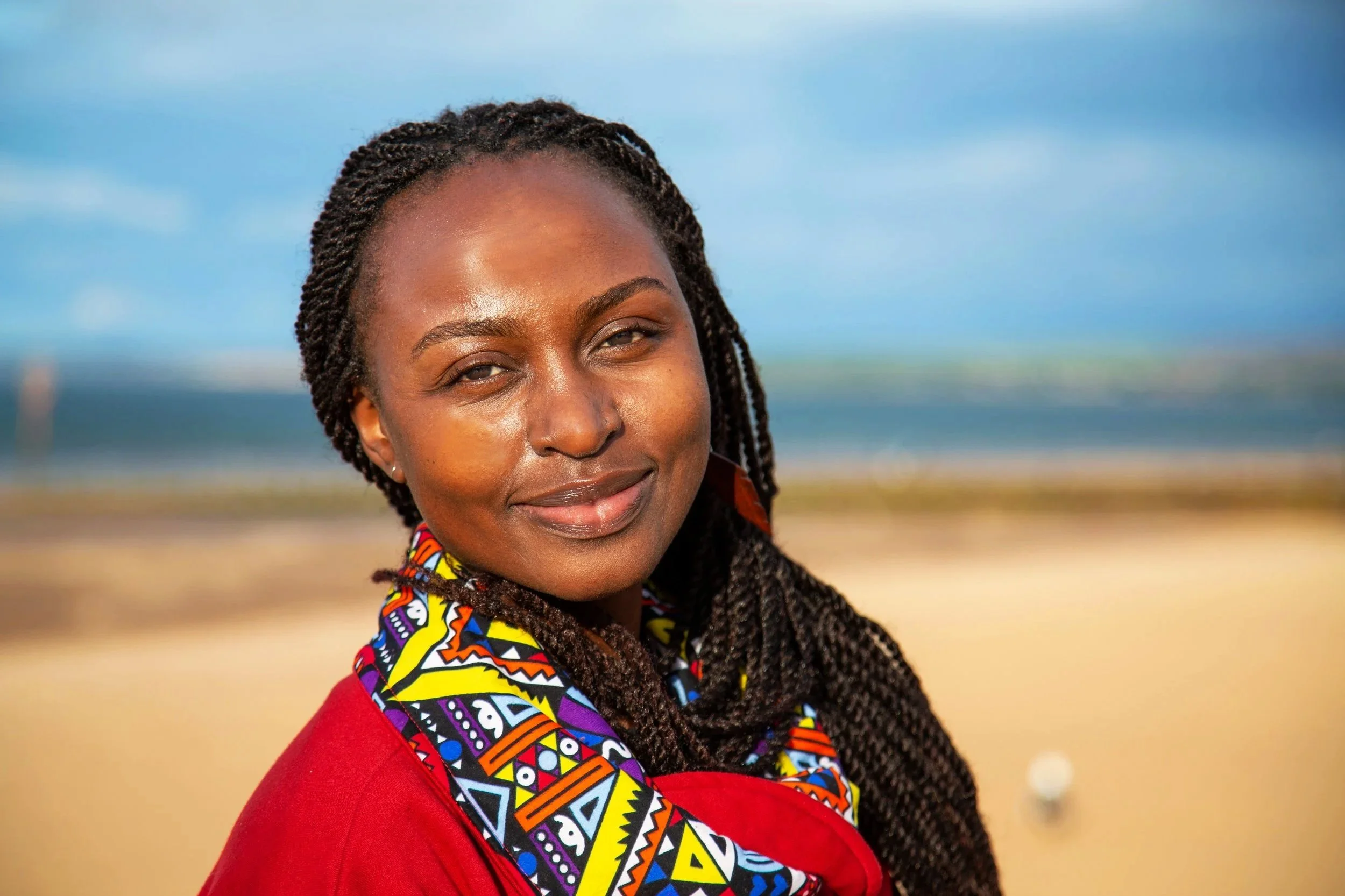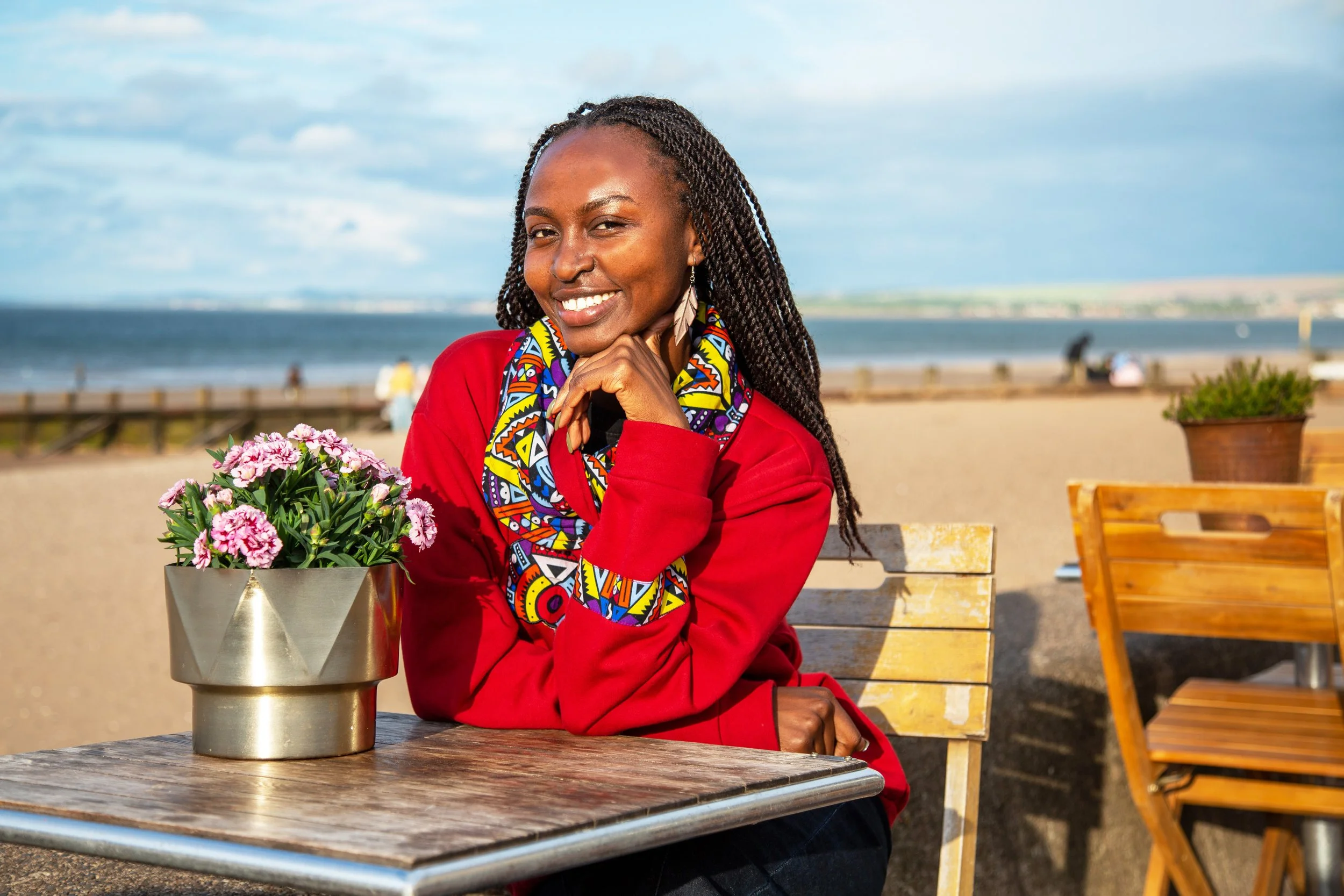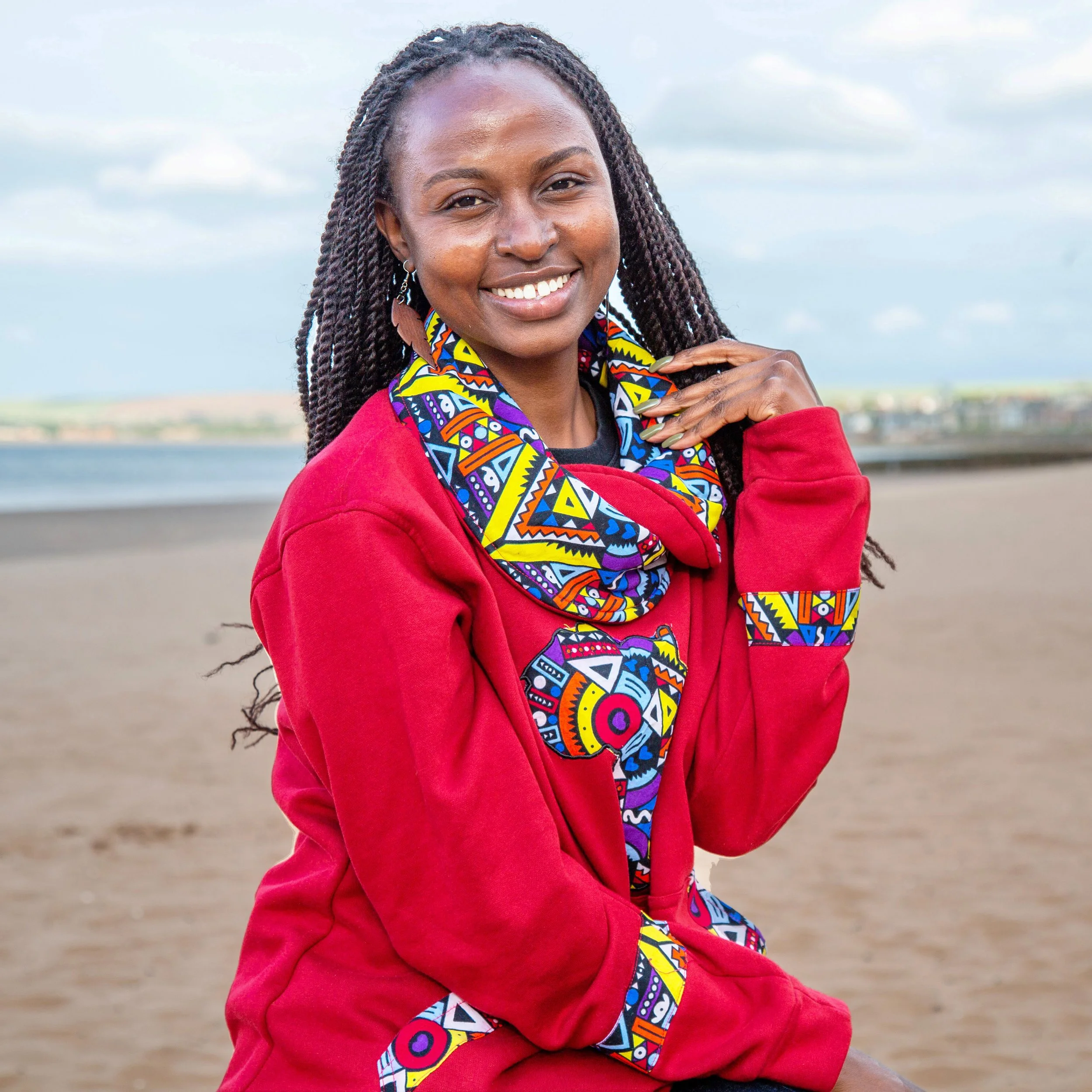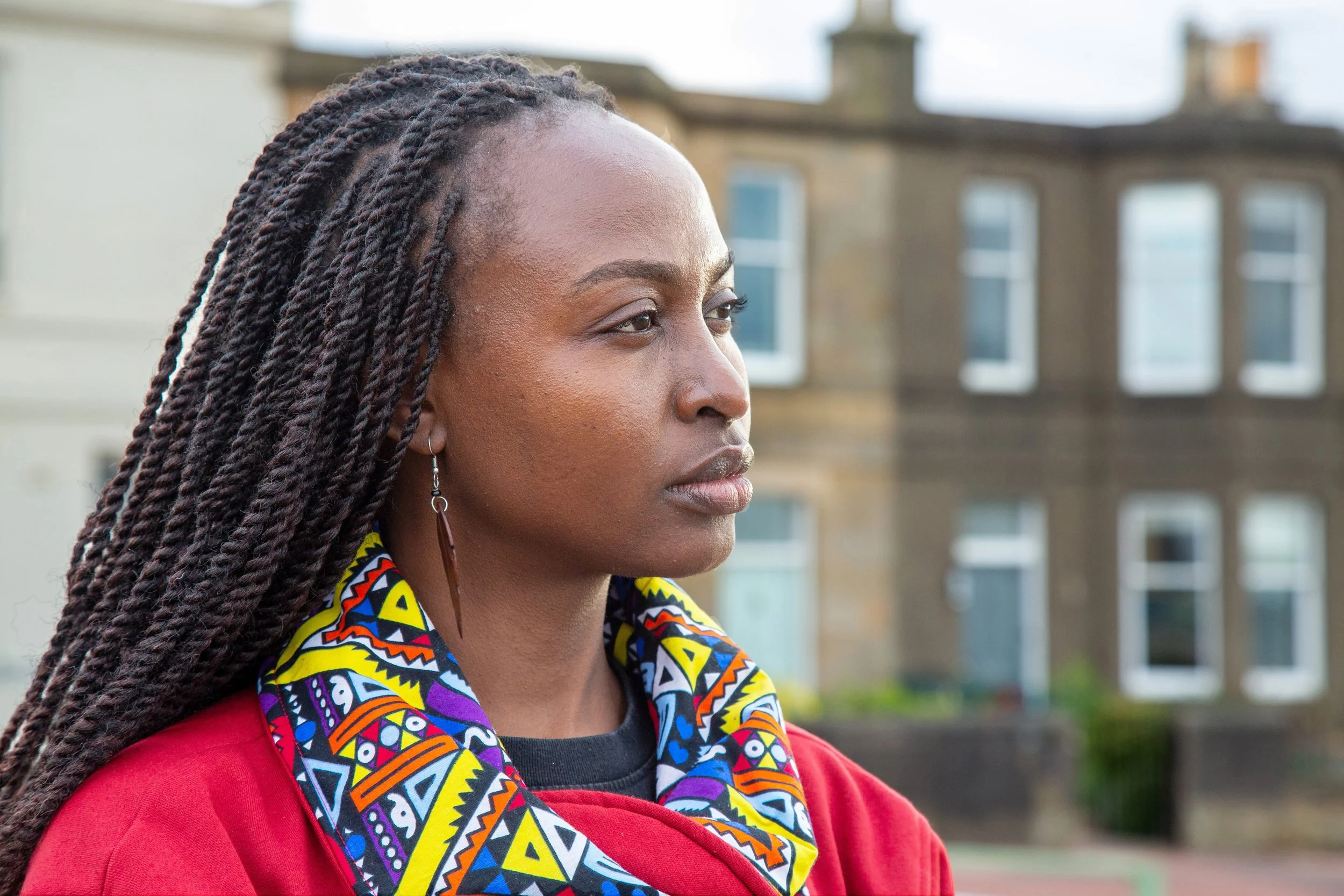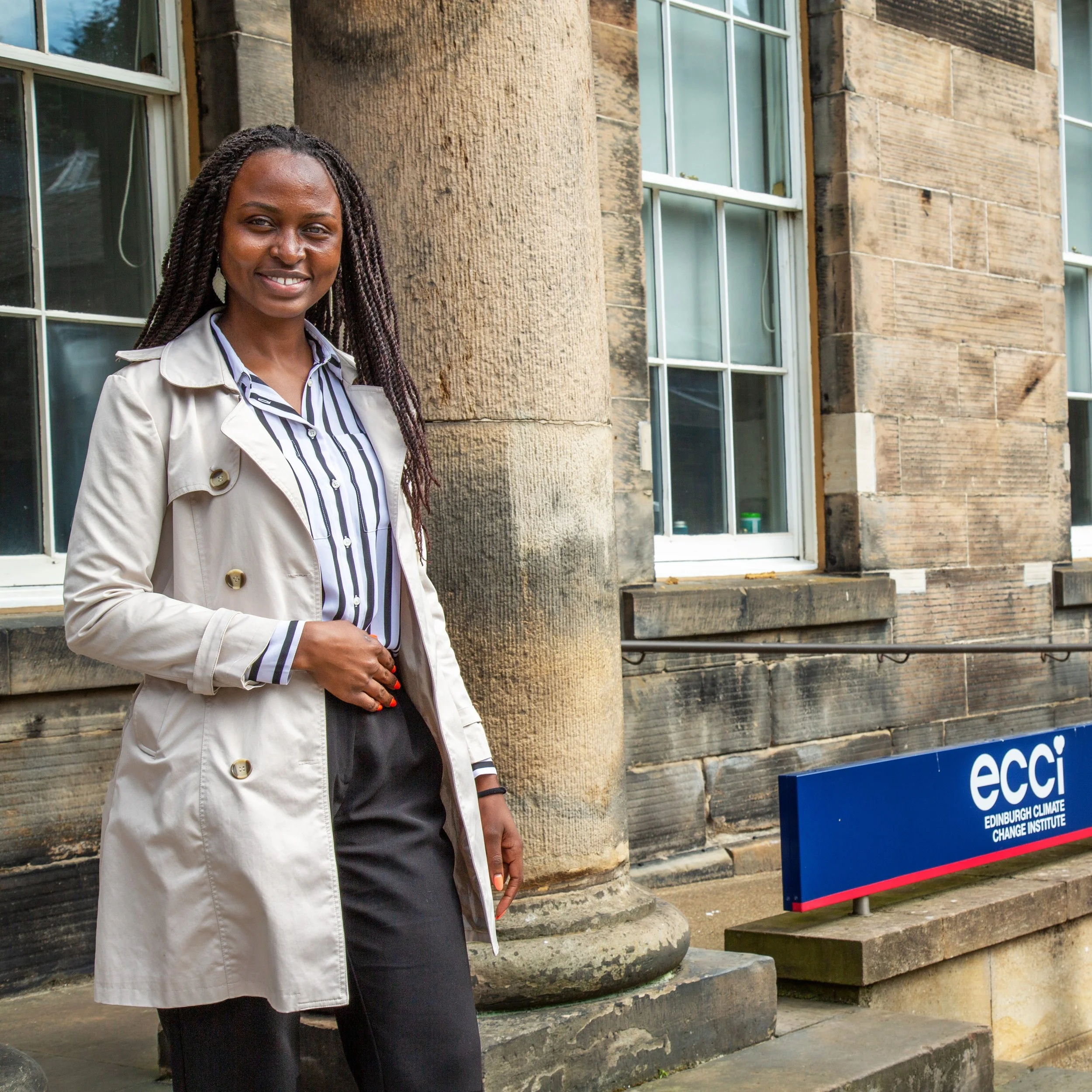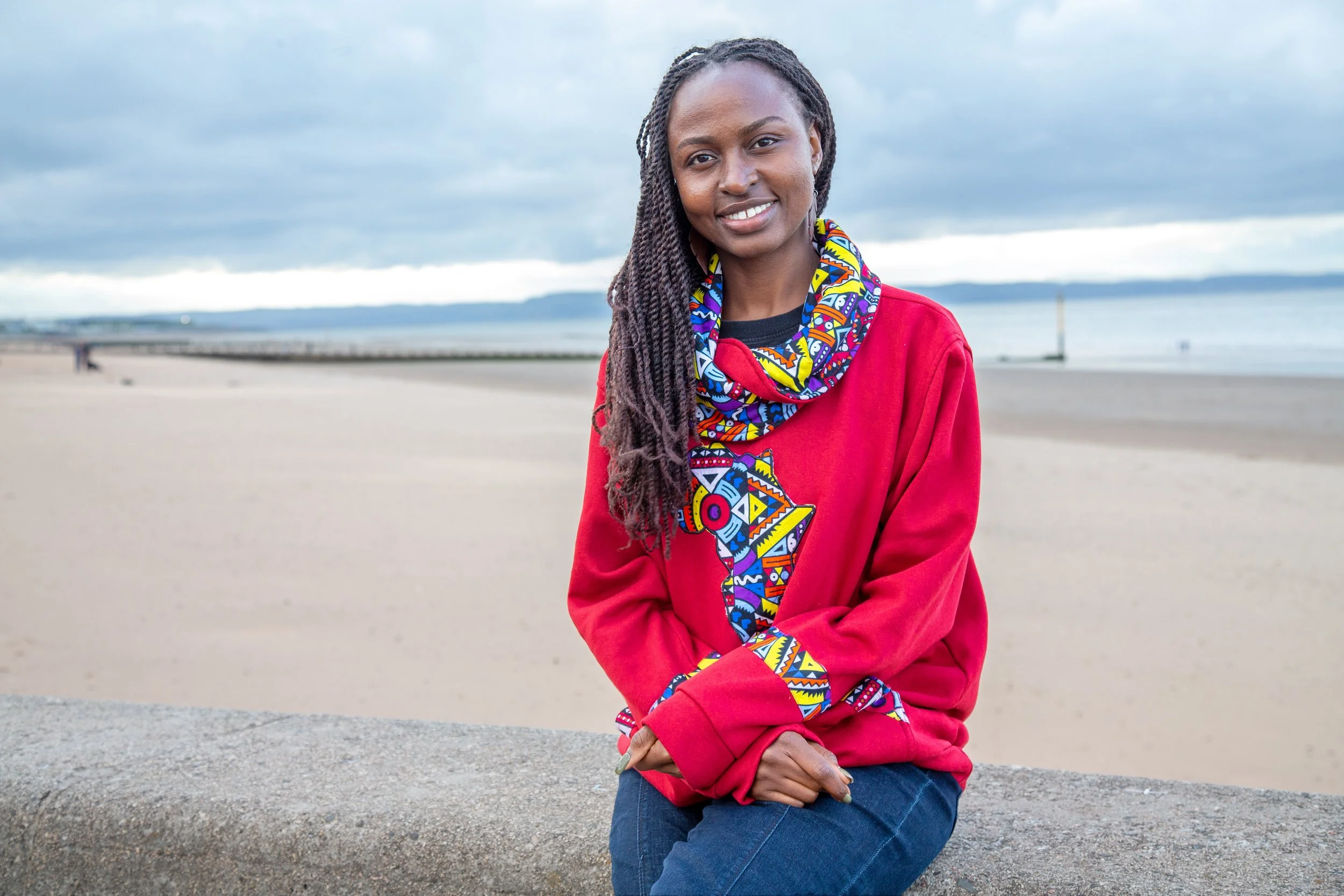Faithy’s Journey ~ from Rural Kenya to Mastercard Mentor
Early Childhood
What are your early memories of growing up in rural Kenya?
“I went to a public primary school. In Kenya you can either go to a private school or a public school. For private schools, people must pay a lot of money and it's only a subset in society who can afford that. Public schools are funded by the government. When I was starting my primary school, we had free primary education, so we didn't have to pay anything. My mum was very strict about going to school and performing in school, so I remember studying a lot. And I remember playing a lot. I remember running things around the household, doing chores like fetching water from the river every evening after school.”
How far away was the river?
“Just a kilometre. We lived in Mbale, which is a very green environment. It's very hilly and our home area around the village is very beautiful.”
Can you describe the house that you lived in as a child.
“Everybody had the same housing. The house was made of mud and logs, with iron sheet roofing. The ceiling was made of sisal and the floor was made using cow dung. Every other week people would find cow dung and smear their houses with it to make it look presentable. And then there is a specific kind of soil that is used to smooth the walls. It's usually white or cream in colour, both internally and externally.”
What was the benefit of cow dung?
“It just made the house look presentable instead of just being very dusty. It sticks well on the floor. After it's smeared on the floor you have to wait for a couple of hours before it dries. Then you sweep it through. And then it's really smooth. Then people walking on it smooth it off.”
When your mother cooked a meal, how did she cook?
“We cooked using firewood. They would use three big stones, with firewood in the middle. And just with normal aluminium pots. But obviously all the pots, because of the smoke, were black underneath. But they were beautifully clean on the inside.”
Did the cooking take place indoors or outdoors?
“Mostly outdoors, but we had a separate kitchen that was the same design as the rest of the house. But I think my mum told me that before they built that kitchen they had a grass-thatched kitchen. That was maybe in the early 2000s. And then the kitchen would also be a place where the cows and chickens would stay at night. And then there was the main structure, with the bedrooms and living room.”
How many children are in your family?
“Five. I'm the second youngest.”
How did the sleeping arrangements work?
“Typically, all houses would have at most three bedrooms. The first bedroom is for the parents, then one for the boys and one for the girls.”
What would a typical meal be?
“Because we have farms, a lot of our foods were fresh produce. In Kenya, the staple food is ugali, which is made from maize flour. So mostly every evening we ate ugali with vegetables. We have many indigenous vegetables. Breakfast was something like tea and cassava, tea and sweet potatoes or tea and bread. It always includes tea and usually something made of wheat. Most lunches would include cooked bananas, a variety of cassava or sweet potatoes, maybe rice, and lots of legumes.”
Where would your mother buy food?
“We got some of our food from the farms but things like bread, cooking oil or wheat, we got from the market. There was a town area with a market and some supermarkets as well.”
You said that you collected water in the evening. Did your siblings help with that?
“Yes, they did. Everybody had to, apart from my mum but I think she used to do that when she was younger.”
How did you carry the water?
“On my head. I just put a twenty-litre jerry can on my head. It's very heavy. The younger children carry five litres, and then if you're around eight, nine years, you carry ten litres. If you're twelve and onwards you have to carry twenty litres.”
So you have a very strong neck and shoulders!
“Yes! But I cannot do it now.”
When you brought the water home where was it stored?
“We had pots that were made from clay. Some of them would be as big as maybe one hundred litres, or even two hundred. You just filled them. Because it's water for cooking and drinking, this would be indoors, but we could also buy water tanks from the markets, the plastic ones.”
Primary School Days
Was the school you went to in your village?
“Yes, it was in the village. I walked to school every day, 500 metres away.”
How many children were in the primary school?
“I think there were eight classes, and each class would have about 40 students. So, over 300 pupils. The area I grew up in is actually quite privileged, in as much as there was a school at least one kilometre away.”
Did you like school?
“No.”
What was a school day like in terms of hours?
“I used to wake up every day at five to do some housework and chores before going to school. Maybe I'd cook breakfast, sweep the house or wash utensils. Then I had to be at school by 7am. When we all got to school, we had a parade until eight. And then classes begin until 4pm. But, in between, we had a one-hour lunch break when I'd rush back home to have my lunch. during that lunch hour I might also go to the river to fetch some water or do a little chore around the house as well as eating my lunch. Then I’d rush back to school till four o'clock. And then at four o'clock we had to clean up the school as well.
The girls would do the sweeping and the mopping. So that meant we had to go to the river to fetch water to come and mop the classes. The boys would be picking up trash or maybe taking care of some crops or flower beds around the school. Everybody had something to do. The boys knew they should take a farm tool with them to take care of the flower bed or the school crops, and the girls would know that they needed to go to the river to fetch water to clean the classes. Then at five o'clock, we’d all leave and go back home. Then obviously we would have dinner, and I'd do my homework after dinner, maybe from 8pm or 9pm to 11pm.”
That's a long day.
“Yeah, a very long day. I think I remember doing that from ten years old. Primary school goes up to thirteen years.”
What was your favourite subject in school?
“Math. Absolutely. I love math, but I was a good student in all subjects, other than the social studies. I kind of struggled with social studies. We had five subjects: math, English, Swahili, science, and social studies. We did those right the way through primary school.”
You told me that your dad passed away, which left your mother with a financial problem. But you were such a bright pupil that your teachers put you ahead a year. But your mother wasn't so pleased about that. So just tell me a little about that.
“So I was a very bright student. Back then our primary schooling was from grade one to grade eight. When I go to grade six my teachers needed more students to fill up the numbers in grade eight, because apparently the government wanted a certain number of students registered in grade eight. And they were short of two students. So they had twenty-eight, and they needed thirty. So the teachers thought, let's go back to grade six and take the two brightest kids and push them to grade eight. I was one of them, so I skipped grade seven.
But my mum was not happy about it because she said she wasn't prepared to have a ‘candidate’. When you're in grade eight, you're a ‘candidate’, which means at the end of the year you have to take the national exam that will take you to high school. My mum was not ready to have a candidate that year. She needed the two years to figure out where she was going to get my school fees for high school.
Anyway, the teachers won and I went to grade eight against her wishes. And I performed really well, actually, and passed everybody. So after I finished my grade eight I did my national exams, but my mum was, like, there's no way you're going to high school! You're only eleven years old. You can't go to high school. You'll be bullied in high school. It was so funny.
So I went back to grade eight and re-joined my peers who I had left in grade seven. I had been through the system, I knew what to expect and I performed really well that year.
Looking back I'm appreciative of my mum for asking me to go back because my performance was really good. I scored around 330 out of 500 in my first national exam but in my second national exam, I scored 390 out of 500. That meant that I could go to a national high school, which are prestigious schools in our country. And that year, I also accessed a scholarship to high school.”
Who funded the scholarship?
“The MasterCard Foundation had just launched in Kenya, and I got a scholarship from them for high school in 2011. So if I'd gone to high school in the previous year, I'd possibly not have gotten a scholarship. It was a big relief for my mum.
My dad had passed away and I had three siblings ahead of me. So by the time I was going to high school, all my other siblings had exhausted the money my dad had left, and my mum was in a very thin financial position to support me in high school. So she was very relieved when I got a scholarship. I was actually offered two scholarships.
I wasn't the one applying to scholarships. My mum was the one who was chasing, getting the forms for me, helping me fill them in. I remember on the days of my interviews how she travelled with me. She was praying for me. So, when I got the offer of two scholarships, she was very relieved. Obviously, the one I chose was the best. They were offering a lot more, including psychosocial support. So it was good.”
Faith in Family and Community
You said your mum prayed a lot for you. Was your mum a Christian?
“Yeah, my mum is a Christian.”
So you grew up in a Christian family?
“Yeah, I did. To this day my mum reminds me every time, maybe if she thinks I might make a bad decision, “Remember I prayed for you to get that scholarship!””
How did Christianity play into your childhood?
“Our family went to church, but for me I just went to church because everybody’s going to church and my mum wanted us to go to church. I knew there's a God and we should fear God. But it wasn't something I really understood. It was more of a performative activity to do. But also church had a very good community. At Christmas time all the kids would come together, and we would dance and just have so much fun.
Church also gave a place of belonging and identity and also some degree of protection. If someone found you stranded in town, for example, they would likely know you from church and they could easily take care of you.”
Did most people go to church?
“Yes, most people went to church.”
And is that still the case today?
“Yes, but I realise that majority of people who go to church right now are our mothers. The young people are not going to church. Things have really changed with development. Obviously, for example, we no longer live in the same house. We have a modern house right now. We have electricity. We have water. And so does everybody else in the community. Most people, but not everybody. Some people are still struggling.
With modernisation more young people are also exposed to other opportunities and information. And then there's also autonomy. And it's kind of sad at the moment because I see that sense of community diminishing every year. And again, children like us left the village. We went to high school. I'm now in Edinburgh. And other people went other places. People got married. So, yeah, I don't think they have children or young people who are really tied to church anymore. I think it's more the old people who are going to church.”
High School in Nairobi
So you got the Mastercard scholarship to go to high school.
“Yes. We lived in the west side of Kenya but for my high school years I went to central Kenya, very close to Nairobi and about nine hours by road from home. I was in a boarding school. I visited home three times in a year – twelve times in four years.”
How did you adjust to that?
“That was difficult. I was thirteen years old. It was a very daunting experience. I remember thinking to myself, my performance is good, but not as good as anybody else in school. So I wanted to go back to a school that was close to home and a school where at least I knew I was one of the best performers. I was now in a space where everybody was amazing, everybody got good grades and the competition was very high. Besides academia, there was also the factor of social classes. I came from a village and some of my classmates were from very different backgrounds - daughters of politicians, daughters of very wealthy people in the country. I felt privileged, but I'm a privileged poor, I thought. I can afford the school because I have a scholarship, but then when it comes to fitting in, I don't fit in.
When I look back now, I think we were just being kids. When kids from a certain background gather together they understand each other. So there were at least two or three classes in the school: the high class, the middle class, and then the lower class. So in the lower class, we understood ourselves. We’d keep to ourselves. The high classes kept to themselves. But that also came with its own challenges because when you're from the lower class it’s even hard to take up leadership opportunities, unless you're very extroverted, or very aggressive.
But even then, I just found a way to integrate into the system.”
You found a way?
“Yes. It wasn't easy, but I had mentorship from my scholarship programme and psychosocial support. They helped me navigate the social aspect of high school and gave me a mentor right the way through school. They used to visit me twice in a term. It was somebody who had gone through the same process, the same system, as I had. So they would tell me, just focus on your studies, get a good grade, and it will all make sense. Which is true, actually.
So, I just decided to focus on school. Again, it's very nuanced. When I decided to focus on school and started getting really good grades, it meant that my social status rose. Some kids from the higher classes approached me to help them solve some problems. And I gained some respect from that.”
Was maths still your outstanding subject?
“Yes. Maths was still my outstanding subject. I got everything correct in my last maths exams. But English was not my best subject. I could speak English. I could respond to questions in English, but English as a subject, not as a language, was difficult for me.”
What was the daily routine in high school?
“First of all, I must say that I went to a really good high school. It was actually a Catholic high school.
We were required to wake up at 5am and be in class at 6am. In some schools kids need to be in class by 4am. But for us it was 6am. At 6.30am you could go to mass, if you were Catholic. It was optional. And then at 7am we would have breakfast until 7.30am. Breakfast would be good food - carbohydrate and protein. And then at 7.30am we would have a parade where the principal would address us.
Our classes started at 8am. We would have classes from 8am to 1pm, maybe four lessons. At 1pm we would go for lunch. I don't remember the details very well, but I think it was a one-hour lunch break. At 1.30pm, if you were a member of a club, you could go for a club meeting. From 2pm to 4pm we would be in class. We would have two or three afternoon lessons.
Our classes ended at 4pm. We would go back to our dorms and change, and then do our laundry or rest if we wanted to. So, that happened from 4pm to 6pm. Then at 6pm we would go for dinner and at 6.30pm we would go for Mass. It was compulsory that everybody go to that Mass. Then we would be in class from 7.30pm to 9.30pm. Those are preps where we did self-study. We'd do that until 9.30pm. We were all required to be asleep by 10pm. Most often, I didn't sleep for seven hours. Maybe for two, three or four hours.”
How many subjects did you study in high school?
“For the first two years, twelve subjects. I did Mathematics, English, Swahili, Biology, Chemistry, History, Religious Studies, Geography, Computer Studies, Art and Design and French. And something else that I've forgotten. In my third and fourth year, I did eight subjects. Maths was my favourite. I liked History. I liked Religious Studies. I also liked Biology and Computer Studies. I loved Computer Studies.”
University Education
So, you went to university?
“Yes, I went to university. For my undergraduate I studied Library and Information Science, but that's not what I wanted to study. I was thinking that I would navigate towards Computer Science, BSc. I also loved mathematics, so I wanted to do Economics and Statistics.
But I was very busy around that time. I was working in a bank for six months, and I didn't have someone to mentor me on how to make applications. So, I ended up not getting a place in my first application and I had to do a second application. For the second application, I just wanted to choose anything in the two universities in Nairobi, because I knew if I was in Nairobi I would have more opportunities for growth. So, I just chose Library Science.
I was very aggressive in looking for opportunities for growth, leadership, youth opportunities and doing volunteering. I was very convinced that the only place that would expand for me would be Nairobi. So, I thought, I'll take anything for my undergraduate. And then, for my masters, I’ll do something that I really want to study.
So that was my strategy. And, throughout my undergrad studies, while studying, I was also volunteering. I was chasing opportunities. I was just going out of my way. My leadership skills and communication skills were growing. I was very active. I wasn't just a student. I was just out there. The mentorship scheme had helped me with that. I was shy, but I had to go out of my way a lot of times and push the boundaries.”
Were you funded by Mastercard through university?
“No, so that was self-funded. After high school I did an internship and all the money I got from that went to university.”
From Nairobi to Edinburgh
Tell me your story from the end of university to being here in Edinburgh.
“So, when I was in university I was a very active student. I had travelled to the US and UAE for youth leadership programmes. I had participated in a few other leadership programmes too. And so, all this culminated in a job after university with Equity Group Foundation based in Nairobi. I was working as a youth leadership programme assistant coordinator.
I did that for two years, through COVID - 2019, 2020, and a bit of 2021. My role involved inspiring young people. I would lead sessions on communication skills, leadership, how to get opportunities. I would basically just share my story.”
Were you using material that you devised yourself, or a course developed by the Equity Foundation?
“It was both. Because it's a job, I had to use a course delivered by Equity Group Foundation. But I'd add to it using my personal experience. Basically, we were developing young leaders. I was an upcoming leader myself, and I was tasked to develop other young leaders and change makers. I was working in Nairobi, but I travelled to different universities in Kenya to meet young people and undergraduates.”
How did you come from doing that to doing this?
“In 2020, during COVID, I thought this is the perfect time for me to apply for a master's programme of my choice, something that I really want. I was already doing leadership. I was passionate about girls' education. I had a community-based programme called Echoe Girls Vision. Besides my own work, I would also go to high schools and speak to girls, inspire them and share my story with them.
So, when it came to choosing my master's programme, I was thinking about development. How do we develop? I was already into youth, gender, education, so I wanted a programme that would culminate all this. And then I came across the Edinburgh International Development course, which was also focused on development in Africa. And it was funded by MasterCard Foundation, a programme of which I was a beneficiary in high school, and a programme whose values and mission was very core to the person I am. Their focus on developing young leaders and changemakers is what I was doing, so the master's programme and the scholarship all combined and just fit me perfectly. So, I started my master's programme in Edinburgh in 2021. I was really inspired. That year changed me. Also, just moving to Edinburgh and a new culture. There was a lot to navigate.
Through the master's programme I was able to describe the work that I was doing using development terms. I was making change through education. There's an aspect of gender development there as well. So, it helped me describe my work. And then I think Edinburgh taught me how to be a critical thinker. I had never previously been taught how to be a critical thinker. And then, I also learnt other interests, like research. It opened my mind to different ways of doing things. I became very open-minded, just embraced different people and their cultures.”
A Journey in Faith
How has your faith journey developed?
“When I was doing my master’s I would say I prayed, but I wasn't even going to church. I was a very nominal Christian. My faith was not central around that time. But after I finished my master's, something just came on me that I need something more in Edinburgh, to grow me here.
A friend of mine from my class asked me to go to their church, so I went. And the moment I went to their church I felt this is a place I could belong. After my master's many of my friends had left Edinburgh, and I started making friends in that church. And after six, seven months, I felt this is maybe where I should be coming. And I got baptised there after seven months.”
Is your faith central to your life now?
“Yes, my faith is more alive now. I have challenges here and there. Sometimes I get consumed by other things and then I have to bring back myself to my faith and remind myself why this is so important to me. I would say ever since I decided to embrace Christianity, my faith, I have seen changes in my life. I think in more clear ways, and I have a community also. I always tell my family that one of the things that grounds me in Edinburgh is my church family. It feels like home, you know.
My family was really surprised when I told them I was getting baptised. They didn't expect that. They knew, oh, she grew up in Christian, but oh, you're really actually taking the step to get baptised! But it's been a very good journey, a very peaceful journey, and I like it. My faith, my church, Christianity has grounded me in Edinburgh.
That came first, and then my work came second. I know I have something to do when I wake up every morning. I know I'm going to make a difference in someone's life, and I do that through my work. So that also grounds me in Edinburgh.”
Women in Leadership
How do you think the role of women in leadership in Africa has changed, is changing, or will change?
“I can only speak to my own country, Kenya. With globalisation and Western influences, the government has taken steps in involving more women in leadership. In the last fifteen years we had a new constitution that had spaces for women leadership. At the same time, we have also seen in the last years more women have been elected to leadership positions in Kenya, which has been really good.”
In politics?
“Yes. But equally, we also have seen so many women taking executive positions in companies in the country. If I compare when I was growing up, maybe in my teens, and now, I see more women in leadership now than I did back then. And that is because more people are embracing gender equality. More people are recognising that women also have abilities, and they are just as good as men in leadership.
This could be influenced by our current generation, you know. More young people are very open-minded. They don't mind having a female boss. I wouldn't say the same happened in the previous generations. There is a generational shift within the Kenyan context. But I also recognise it's not a one-size-fits-all. I know there are some cultures that shun away from having women leaders. So there's still work to be done. But there are many programmes. For example, MasterCard Foundation is focused on empowering women. They empower 70% women in all their projects.
There are many other programmes that have been focussing on uplifting women. So, women have more opportunities now than before. Even for the girls I mentor they would be shy to apply for opportunities because they say, oh, I'm a woman, I don't think I'm qualified. But now they know that there are spaces for women. So more girls are applying for things because they know that there's a realistic opportunity for them.”
Of the girls who come here, for example, to do a postgrad sponsored by MasterCard, how many will go back to Africa, and how many will stay?
“I think it's 50-50, it's half-half. When I came here, my goal was clear - do my master's, then go back home and continue running my programme. And I would say when we interview girls, it's usually the same - come here, do a master's and go back home. But a lot of the students who come on our scholarship programme stay here.
That's because for me, for example, I am making more impact on my family. I'm sad by being here in a way, but I'm able to support them better and I'm able to inspire other girls better because I have some resources for that. But in the long term, I would prefer to be physically present for them as well.
I've been able to build experience here, and if I go back home, I'll be more competitive in the market. At the same time, I've had a chance to create networks to help if I continue working in my Echo Girls Vision program.”
And Finally …
On a perfect day, when you're not working, what would you do?
“On a Saturday - when I'm not having an interview with you! - I would go for a run or a cycle. I have so many plants in my flat, so I would spend a couple of hours watering them and taking care of them. I have friends in Edinburgh and almost every other weekend I would schedule a meet up with a friend. I either go to their house, or they come to mine for a dinner or lunch. Or we just meet outside for a chat. I have not been reading much recently, but that used to be one of my pastimes too. So it's a mix of attending to my physical health, cleaning my environment and socializing.”
What's the best decision you ever made?
“The best decision I ever made? I think it's to be a Christian, yes.”
What three words describe you?
“Introspective. Spontaneous. Organized.”
If you could go back and give your sixteen year old self some advice, what would it be?
“I would say, ‘It will all work out and it's gonna be alright.’”
Where is your favourite place?
“In Kenya, with my mum and my nieces and nephews.”


